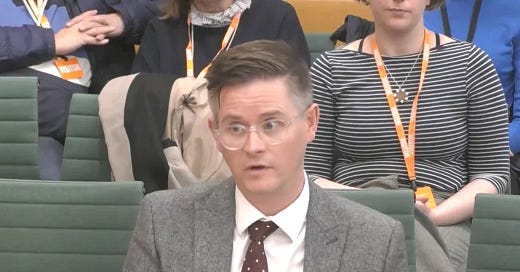Kay Burley retires | AI copyright plans dubbed 'huge mistake'
Plus Mail Online is sued by an agency over an image of Mahsa Amini and Tortoise appoints co-CEOs from both sides of the Observer acquisition
Good morning and welcome to your daily Press Gazette media briefing on Wednesday 5 February.
News industry representatives argued the case in Parliament yesterday against plans to water down copyright law in order for the UK to cosy up to AI companies.
Proposals to make it easier for AI companies to help themselves to the painstaking work of professional journalists would be a "huge mistake", Financial Times policy chief Matt Rogerson told MPs.
Some AI companies and legislators appears to see news as a commodity which is as free as the air and should be made available for free to whoever wants to use it. But all that news has to be uncovered by someone, and that person has to be paid (otherwise it will quickly stop being produced).
Take the current list of UK national newspaper editors collated by Press Gazette. It is a fairly easy thing to produce but does require a degree of effort, craft, insider knowledge and verification to keep updated in a world where senior journalists have a bewildering array of titles.
It is the sort of thing which generative AI companies can (and do) help themselves to and pass off as their own work.
If all the exclusive information Press Gazette has sourced becomes fair game the incentive for us investing in original newsgathering will be gone (as will the information itself).
Today we report exclusively on a different version of this argument which is being played out at county court in Kent, where a news agency is suing Mail Online over use of an image it supplied of an Iranian woman who was beaten to death in 2022 for not wearing a headscarf.
Mail Online is arguing that the agency cannot prove it owns the copyright of the image, which was sourced in Iran.
The agency says it should be paid nonetheless for the effort which went in to sourcing and supplying the image.
While the facts of that particular case are complex it is undoubtedly true that all the major UK news publishers play fast and loose with copyright when it comes to using each other's work.
And if original reporting is to have any future we need a legal system which places value on it and allows the originators of content to get paid.
This morning Kay Burley announced today had been her final broadcast for Sky News after 36 years at the channel and more than one million minutes on air. It's a good opportunity to revisit our 2014 interview with her which turned out to be quite an intimidating experience for young reporter William Turvill (now senior business correspondent for The Sunday Times) and illustrates the steel she brought to interviews, whichever side she was sitting on.
And as Tortoise Media gets set to start publishing The Observer it has appointed Guardian chief strategy officer Richard Furness as co-CEO alongside former Tortoise managing director Emma Sullivan. James Harding remains the biggest shareholder in the merged company and editor-in-chief.
On Press Gazette
FT policy chief warns MPs watered-down copyright regime for AI is ‘huge mistake’
“There’s nothing wrong with UK copyright law,” Rogerson said. “It’s completely clear that what’s been going on is a breach of UK copyright law.”
Mail Online sued by agency for payment over Mahsa Amini image
Mail Online publisher DMG Media says it plans to “vigorously contest” what it describes as a “baseless claim”.
Kay Burley retires from Sky News: ‘Let politicians of every party rejoice’
Sky News executive chairman David Rhodes wrote to staff immediately after the broadcast, saying: “Talking with Kay about her plans, we all felt it was more fitting that Kay break this story herself. She’s done that now in her own words, and we’ll be sharing the clip on social channels today.”
Tortoise appoints co-CEOs from both sides of Observer acquisition
Tortoise has also appointed Basia Cummings, who has been leading its audio arm Tortoise Studios, as digital editor of the new daily online paywalled version of The Observer.
News in brief
Sherwood will make a 'small number' of staff redundant, Tegna's closure of its Verify operations is to lead to an unknown number of layoffs, and The Los Angeles Times is offering voluntary buyouts to help manage costs. Press Gazette analysis shows more than 900 journalism industry job cuts in the UK and US in January - a similar level to January 2024 and 2023. (Press Gazette)
The United States Agency for International Development (USAID) which is potentially being shut down by Donald Trump is one of the biggest donors to BBC Media Action. USAID was the BBC charity's second-biggest donor last year, giving £2.6m. (Mail Online)
Fox Corp revenue was up 20% in the final three months of 2024, credited to the presidential election and a huge sports season. Lachlan Murdoch said Fox is looking at launching a direct-to-consumer service across news and sports. (The Hollywood Reporter)
Future says it remains on track to meet full-year expectations of revenue around £776.9m and adjusted operating profit of £217.8m. In the last four months its brightest spots were US digital advertising and e-commerce. (Future)
Reuters is launching its subscriptions in the Gulf states for the first time alongside an Arabic website as it expands its Reuters Next leadership summit to Abu Dhabi. (Reuters)
Also on Press Gazette:
Mail Online becoming home for in-depth multimedia storytelling with Deep Dive strand
UK-based sports publisher aims to create 100 new jobs in 2025
Digital advertising and cost cuts fuel growing profits at Mail titles
Nine reasons why Mirror journalists think page-view targets are wrong
Will Hayward says quitting Wales Online to launch Substack was financial ‘no-brainer’
Major job cuts at Mail titles in final stage of digital-first transition
Latest Press Gazette podcast
Podcast 81: Super soaraway Substack, how Youtube became newstube and why Prince Harry took the cash
Bron Maher discusses Press Gazette's new ranking of the most lucrative titles on Substack, Charlotte Tobitt explains how and why publishers are currently so fixated on building their followings on Youtube and Dominic Ponsford shares his view on why Prince Harry decided to take News UK's cash rather than have his day in court with The Sun.





